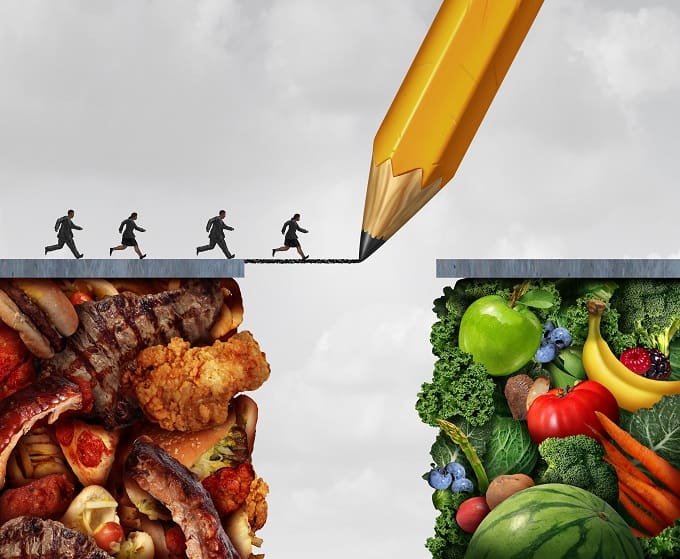The food choices we make have a profound impact on the health of our planet. By shifting towards a greener diet, we can help combat climate change, reduce resource consumption, and protect biodiversity. From opting for plant-based meals to supporting sustainable farming practices, every decision matters in building a more eco-friendly future. This article explores how simple dietary changes can promote environmental sustainability while fostering compassion and care for the world around us. Discover practical steps to align your plate with the planet’s needs and contribute to lasting positive change
As awareness around climate change and environmental sustainability grows, individuals are becoming increasingly conscious of the impact of their everyday choices on the planet. One area in which our choices can make a significant difference is our diet. In this post, we will explore how our dietary choices can directly affect the environment and discuss the benefits of adopting a greener diet. So, let’s dive in and discover how we can contribute to a more sustainable future through our food choices.

The Impact of Your Diet on the Environment
Your diet directly affects the environment and can contribute to a greener planet.
The agriculture industry, including animal farming, is a major contributor to greenhouse gas emissions.
Choosing sustainable, plant-based options can help reduce deforestation and land degradation.
Eating more locally-sourced and organic foods can also have a positive impact on the environment.
Promoting Sustainability through a Greener Diet
Adopting a greener diet promotes sustainability by reducing resource consumption.
Plant-based diets require fewer natural resources like water and land compared to meat-based diets.
Eating sustainable foods can help preserve biodiversity and protect endangered species.
Promoting sustainable agriculture can also support local farmers and communities.
Reducing Carbon Footprint with a Plant-Based Diet

A plant-based diet has a lower carbon footprint compared to a diet rich in animal products. Animal agriculture is responsible for significant emissions of methane, a potent greenhouse gas. Choosing plant-based protein sources like legumes and tofu can help reduce carbon emissions. By reducing meat consumption, individuals can make a meaningful impact on global emissions.
Choosing Vegan Options for a Sustainable Future
Choosing vegan options promotes a sustainable future by reducing animal cruelty and exploitation. Vegan diets have been shown to have lower environmental impacts compared to diets that include animal products. Eating vegan can also minimize water pollution caused by animal waste in factory farming. Veganism supports a more ethical and compassionate approach to food choices.
Here are some reasons why choosing vegan options is beneficial for a sustainable future:
- Reducing Carbon Footprint: Animal agriculture is a major contributor to greenhouse gas emissions. By choosing plant-based alternatives, such as tofu or tempeh, individuals can help reduce carbon emissions.
- Preserving Biodiversity: Vegan diets help protect endangered species by reducing the demand for animal-based products. This helps preserve the Earth’s biodiversity.
- Minimizing Water Usage: Animal agriculture requires vast amounts of water for animal feed and processing. By opting for plant-based foods, we can conserve water resources and minimize water pollution.
- Supporting an Ethical Approach: Veganism promotes a more ethical and compassionate approach to food choices, ensuring that no animals are harmed or exploited in the process. This aligns with the principles of sustainability and a greener planet.
Transitioning to a vegan diet is a powerful way to contribute to a sustainable future. By making conscious food choices, we can make a positive impact on our environment, biodiversity, and animal welfare.
The Connection Between Food Choices and Climate Change
Food production and consumption play a significant role in climate change. The meat and dairy industry contribute significantly to greenhouse gas emissions. Adopting a greener diet can help mitigate climate change and promote global sustainability.

Understanding the connection between food choices and climate change is crucial for a greener future.
Simple Steps to Adopt a Greener Diet
Transitioning to a greener diet can start with small changes like incorporating more plant-based meals.
Here are some simple steps you can take:
- Replace meat with plant-based alternatives: Swap out meat for plant-based alternatives like tofu or tempeh. These protein-rich options are not only delicious but also have a lower impact on the environment.
- Grow your own fruits and vegetables: Consider starting a small garden at home and grow your own fresh produce. This can help reduce packaging waste and carbon emissions associated with transporting food.
- Educate yourself: Take the time to learn about sustainable food choices and their impact on the environment. By understanding the benefits of a greener diet, you can make more informed decisions.
- Support local, organic farmers: Buying locally-sourced and organic foods supports sustainable farming practices and helps reduce the carbon footprint associated with long-distance transportation.

Remember, every little change counts and can contribute to a greener planet!
Conclusion
By adopting a greener diet, you not only contribute to a more sustainable and eco-friendly planet but also take steps towards improving your own health. The impact of our diet on the environment cannot be understated, as the agriculture industry, particularly animal farming, is a significant contributor to greenhouse gas emissions and deforestation. However, by choosing plant-based options, supporting sustainable agriculture, and reducing our meat consumption, we can make a positive difference.
Transitioning to a greener diet doesn’t have to be overwhelming. Start by incorporating more plant-based meals into your routine and replacing meat with delicious alternatives like tofu or tempeh. Additionally, consider growing your own fruits and vegetables at home to minimize packaging waste and reduce carbon emissions. Educating yourself about sustainable food choices and supporting local, organic farmers are essential steps towards a greener and healthier diet.
Remember, the choices we make about what we eat have a direct impact on our planet and future generations. By understanding the connection between food choices and climate change, we can actively work towards a more sustainable and compassionate world. Every small change makes a difference, and together, we can create a greener future.
3.9/5 - (7 votes)



